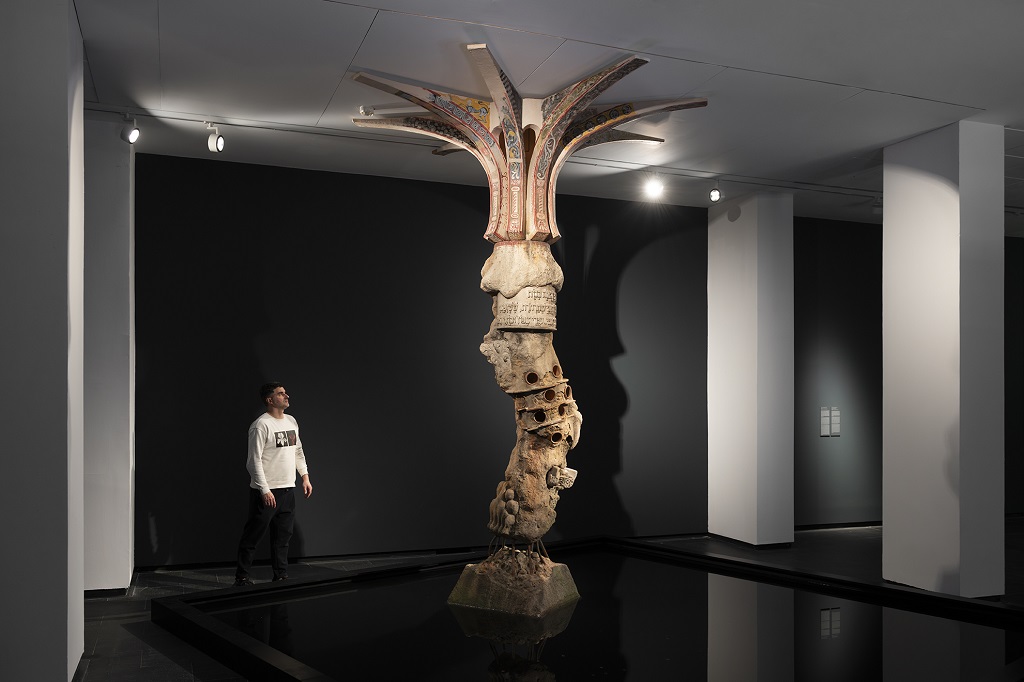- CA2M MUSEUM
- exhibitions
- ASUNCIÓN MOLINOS GORDO. DÉJÀ VÉCU. WHAT HAS ALREADY BEEN LIVED
ASUNCIÓN MOLINOS GORDO. DÉJÀ VÉCU. WHAT HAS ALREADY BEEN LIVED

Asunción Molinos Gordo "Quorum Sensing", 2023. Courtesy of the artist and Travesía Cuatro.
Curated by Andrea Pacheco González.
The oeuvre of Asunción Molinos Gordo (Guzmán, 1979) includes a wide range of media and materials, most of which are organic in nature. Her pieces are made with conventional materials such as ceramics, fabric or wood, but she also uses unusual elements such as bacteria or human faeces. Her projects are the result of research done in situ and almost always linked to rural settings, where she carries out eclectic fieldwork encompassing everything from microbiology to divination. A discipline that helps us to understand her work is alchemy – al-khīmiyā – and the verb associated with it: transmutation. This is at the heart of her work. Just as alchemists searched for the philosopher’s stone that could turn lead into gold, Asunción seeks – and succeeds – in transmuting a mundane material into a precious one.
Déjà Vécu is her first solo exhibition in a public institution in Madrid. The exhibition is the result of an in-depth exchange between the artist and the curator over the past five years, during which they set out to critically review historical narratives, cultural hierarchies and the construction of collective identity in the context of the Iberian Peninsula. The group of installations, most of them made especially for this exhibition, addresses the urgency of understanding that history, culture and identity are not fixed or pure bodies, but are shaped by an accumulation of diverse elements that overlap, merge and hybridise as naturally as the chemical and physical processes that sustain life.
The déjà vécu – the already lived – invoked in this project also presents us with a disturbing scenario: that which, although dies, reappears. Each piece in the exhibition invites us to experiment with the ghostly element that is a part of our existence, placed at the inevitable crossroads between the world of the living and that of the dead, between the world of what is and the world of what – apparently – has gone. The exhibition is therefore an exercise in collective memory and, at the same time, in cultural reparation. It reminds us that what has been erased, returns; what has been mutilated, is renewed; and what has been silenced, manifests itself, even doubling the vigour of its former energy. So, can an art exhibition mend a social coexistence wounded by past politics of enmity (Mbembe, 2016)? The answer of this project is that yes, “the dead can inspire the living to act, galvanising those who remain around issues that affect the life of the community” (Despret, 2023) because art continues to be a tool for healing the shared experience of harm.
ASUNCIÓN MOLINOS GORDO
Researcher and visual artist. Her work is deeply influenced by disciplines such as anthropology, sociology and cultural studies. She has produced work that explores land use, nomadic architecture, farmers’ strikes, territorial bureaucracy, the transformation of rural labour, biotechnology and the global food trade.
Molinos Gordo won the Sharjah Biennial Prize 2015 with the WAM (World Agriculture Museum) project and represented Spain at the 13th Havana Biennial in 2019. Her work has been exhibited at venues such as Art Jameel (Dubai, UAE); IVAM, (Valencia, Spain); the Victoria & Albert Museum (London, UK); Delfina Foundation (London, UK); ARNOLFINI (Bristol, UK); The Townhouse Gallery (Cairo, Egypt); Darat Al Funun (Amman, Jordan); Tranzit (Prague, Czech Republic); Cappadox Festival (Uchisar,Turkey); The Danish Museum of Photography (Helsinki, Finland)); Museo Carrillo Gil (Mexico City, Mexico); MAZ Museo de Arte de Zapopan (Guadalajara, Mexico); MUSAC (León, Spain); CA2M (Madrid, Spain); CAB (Burgos, Spain); Matadero (Madrid, Spain); and La Casa Encendida (Madrid, Spain), among others.
She has a degree in Fine Arts and holds a Master’s Degree in Theory and Practice of Contemporary Art from the Complutense University of Madrid. She is currently studying Anthropology and Ethnography at the UNED university.
ANDREA PACHECO GONZÁLEZ
Chilean researcher and curator based in Madrid. She graduated in Social Communications, and holds a Master’s Degree in Art and New Media Curatorship and is a PhD student in Fine Arts at the Complutense University of Madrid. She has headed the MAC Quinta Normal, Museo de Arte Contemporáneo de Santiago de Chile, and been co-curator at the invitation of the Centro de Residencias Artísticas de Matadero Madrid (Corazón Pulmones Hígado, 2019) and at CentroCentro Cibeles (Todo lo demás, 2023). She has worked with artists such as Teresa Margolles (La carne muerta nunca se abriga, 2019); Los Carpinteros (La cosa está candela, Hacia una lectura expandida, 2017); Dagoberto Rodriguez (Guerra interior, 2020), Juan Castillo (Geometría emocional, 2021), among others. She has created projects for institutions such as the Museo de la Solidaridad Salvador Allende, the Museo de Arte Contemporáneo and the Museo de la Memoria, in Santiago de Chile; the Museo de Arte Miguel Urrutia and NC-Arte, in Bogotá, Colombia; and the Centro Atlántico de Arte Moderno de Gran Canaria, Spain. She has co-authored the books Crónicas de Sangre Impura (FelipaManuela Ediciones, 2020) and Sombras ocultas en el tiempo (FelipaManuela Ediciones and Archive Books, 2022). She currently collaborates with the curatorial team of the Museo Thyssen Bornemisza and is artistic director of the cultural spaces FelipaManuela in Madrid and the Instituto de la tierra, Cáceres. She teaches at the Nebrija University in Madrid.
The design for the Déjà Vécu exhibition was by Diogo Pasarihno Studio. The exhibition will be accompanied by a publication and a public programme of activities.
With the support of: Montenmedio Foundation, Art Jameel, Cervezas Alhambra, Museo Vostell Malpartida and Travesía Cuatro.